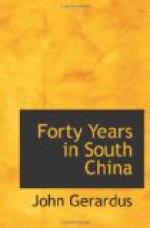In October, 1845, he applied to the American Board of Commissioners for Foreign Missions, through Dr. Thomas De Witt, the Secretary for the Reformed Church. The letter is still in possession. An extract from it reads:
“I was twenty-five years of age last August, reside at Somerville, New Jersey, have been blessed with Christian parents and enjoyed an early religious education. By the assistance of friends and the Church, I have been enabled to pursue the usual course of study preparatory in our Church to entering upon the duties of the Gospel ministry. I graduated at Rutgers College in the summer of 1842, pursued my theological studies in our seminary at New Brunswick, and received from the Classis of Philadelphia, July last, ‘license’ to preach the Gospel.
“Owing doubtless in great measure to the religious advantages I have enjoyed, my mind has been more or less under religious impressions from my earliest recollection. About eight years ago I united on confession of faith with the Church (Reformed Dutch) at Blawenburgh, New Jersey, of which my brother, Rev. James R. Talmage, was then and still is pastor. Was living in his family at the time, and studying with him preparatory to entering college. I am unable to decide when I met with a change of heart. My reason for believing that I have experienced such a change are the evidences within me that I love my Saviour, love His cause, and love the souls of men.
“My reason for desiring the missionary work is a desire for the salvation of the heathen. My mind has been directed to the subject for a long time, yet I have not felt at liberty to decide the question where duty called me to labor until the last month. In accordance with this decision I now offer my services to the Board to labor in my Master’s service among the heathen. As a field of labor I prefer China.”
Owing to deficiency in funds the Board could not send him that year. He accepted an invitation to assist Dr. Brodhead, then pastor of the Central Reformed Church of Brooklyn. Dr. Brodhead was one of the great preachers of his day. In Philadelphia, an earlier pastorate, “he preached to great congregations of eager listeners, and with a success unparalleled in the history of that city and rare in modern times.” John Van Nest Talmage might have been his successor. But no sooner was




